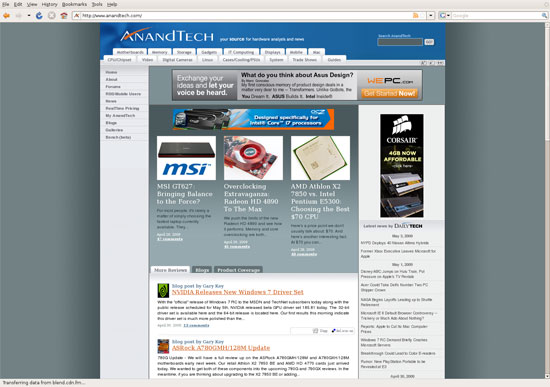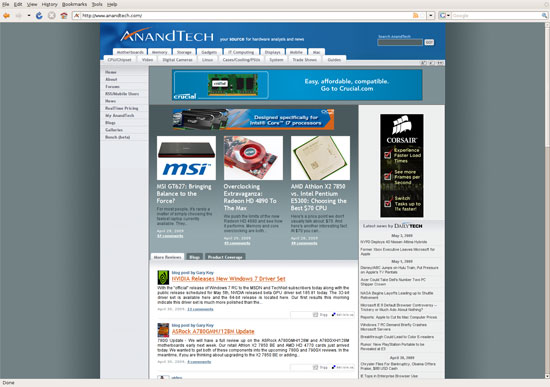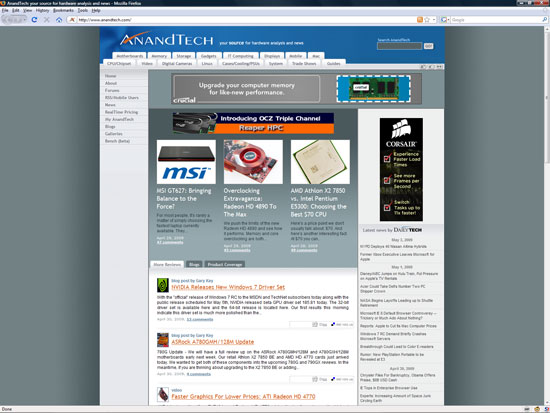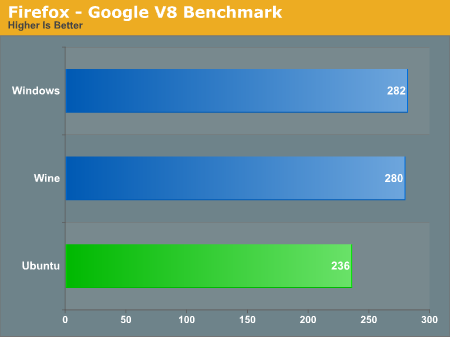Revisiting Linux Part 1: A Look at Ubuntu 8.04
by Ryan Smith on August 26, 2009 12:00 AM EST- Posted in
- Linux
Applications: Web Browsing
Windows Default: Internet Explorer 7
What I use: Firefox 3
Ubuntu Default: Firefox 3
Much to the chagrin of Microsoft, the web browser is turning in to a miniature OS of its own, and in the case of anything that’s not Internet Explorer, it’s a miniature OS that has no allegiance to a real operating system. It’s the primary way to retrieve most information from the internet, applications can be created through AJAX and Flash, video can be watched (see: Hulu). A good cross-platform web browser removes a great deal of the need to use any specific OS, and this is something that works in Ubuntu’s favor.
Ubuntu ships with Firefox 3, Internet Explorer’s loyal opposition and currently the #2 browser on the market. So long as a site isn’t built for IE6 Firefox has great compatibility, good speed, and an army of extensions to add features to it. Since many of you already use it, there’s not a lot to say here: it’s a very solid browser, and something I find to be superior to Internet Explorer.

As I already use Firefox under Windows, the transition here was virtually non-existent. Ubuntu doesn’t have any direct Windows to Ubuntu transition tools, but after moving my Firefox profile from Windows to Ubuntu and reconfiguring a few location-sensitive settings, I was up and going. Internet Explorer users are going to have more of a transition obviously, but it’s not much. All of the major browsers’ core behaviors are the same, which makes it easy to switch among them with little fuss.
At the risk of marginalizing the rest of Ubuntu, I consider Firefox to be one of the core components that makes Ubuntu a success story. Because so much computer use these days is inside a browser, it has become a lynchpin for a good OS. If your browser is bad, then it’s probably hurting the usability of your OS if it means that many users cannot do something they regularly do on another browser. One only needs to look at the early versions of Mac OS X to get a good picture of this, as it shipped with the only-bearable Internet Explorer 5.
There are however a few caveats that I’d like to hit on. Something that continues to throw me for a loop is that while it’s the same Firefox I use under Windows and Mac OS X, it doesn’t necessarily look the same. The rendering engine is the same, but OS differences start to play out here. Mac OS X, Windows, and Ubuntu all render text slightly differently, and in the case of Ubuntu come with a significantly different font set. Because Firefox is at the mercy of the OS for fonts, what you get are small but noticeable differences in how the same page looks.

Firefox with default fonts

Firefox with MS Core fonts

Firefox under Windows
Above we have AnandTech rendered in Firefox 3 on Windows, and Ubuntu. On Windows Firefox uses Times New Roman and Arial for its default fonts, but these fonts do not exist on Ubuntu; rather Ubuntu uses what’s called “serif” and “sans-serif”. This along with how the two OSs differ in font anti-aliasing results in the different look of Firefox under Ubuntu. Having used Windows for a number of years, I have never gotten past the idea of Ubuntu looking “wrong” even though the right look is entirely subjective.
Ultimately I ended up adding the missing fonts by installing the msttcorefonts package, which contains Times New Roman, Arial, and the other “big name” standard fonts. With those installed and Firefox configured to use them, text looks much closer, although not quite the same. It’s a shame that Ubuntu can’t include these fonts by default.
The second caveat is one of performance. When using Javascript-heavy sites in particular, Firefox on Ubuntu seems just a bit slower than under Windows. I had never been able to figure out why until I saw this Slashdot article. Firefox for Linux is not compiled with profile guided optimization, a method of improving the performance of binaries by looking at how they’re used. While Ubuntu compiles their own releases of Firefox, they do the same thing. As a result, there’s a speed difference in Firefox – it’s the same code, but the Windows version is compiled in such a way that it’s faster. As I wrote at the start of this article, I’m not concerned with the performance of Ubuntu or its applications for the most part, and this falls under that notion. Firefox is slower, but not to the point that I care. It’s interesting enough that it bears mentioning, however.
Just to give you an idea of what the speed difference is, here’s a breakout of one of our Firefox benchmarks from the benchmarking section later in this article:

As you can see, in this Javascript-heavy test Firefox on Ubuntu is upwards of 17% slower than it is under Windows. As this performance gap manifests itself largely under Javascript-heavy situations; regular browsing doesn’t show nearly the difference. Flash is also slower, but this has nothing to do with Firefox and more to do with Flash’s mediocre performance under any OS that isn’t Windows.
The last caveat is one of how Ubuntu’s distribution model becomes strained when it comes to Firefox. Ubuntu Hardy shipped nearly 2 months before Firefox 3 did. But because Ubuntu is meant to be a stable platform they still needed to package Firefox 3 with the OS, so Firefox 3 Beta 5 was included. If we had done this article a month after Hardy launched as intended, I’d have few nice things to say. Firefox 3 Beta 5 combined with Adobe Flash 9 was buggy, unstable junk. Canonical made the right decision as the final version of Firefox 3 turned out well, but it highlights the pitfalls of including 3rd party software with the OS.
The flip side of this caveat is that Firefox 3.5.x has superseded 3.0.x as the newest Firefox branch, which means that only 3.0.x versions are being pushed out to Hardy. This means if you want to take advantage of any of Firefox’s newest features such as the new javascript engine, you’ll need to install a 3.5.x build separately, ideally through a PPA package so that it cleanly replaces the default version of Firefox.
But even with those caveats, none of them are serious issues. Firefox 3 is still a fantastic browser and there’s nothing else I’d rather have on Ubuntu.
Final Verdict: Meets My Needs










195 Comments
View All Comments
Kakao - Wednesday, August 26, 2009 - link
Ryan, nowadays you don't need to dual boot. You can just set up a virtual machine. If you are a gamer use Windows as host and setup a Linux distro as guest. If you have enough memory, 4GB is very good, you can have both perfectly usable at the same time. I'm using Virtual Box and it works great.VaultDweller - Wednesday, August 26, 2009 - link
"Manufacturer: Canon"I think you mean Canonical.
Ryan Smith - Wednesday, August 26, 2009 - link
It wasn't in our DB when I wrote the article, it was supposed to be added before it went live. Whoops.Thanks you.
Proteusza - Wednesday, August 26, 2009 - link
I havent been able to read the whole cos I'm currently at work, but so far it seems good. Some people have been saying you should be testing 9.04, and I can see their point, but on the other hand, I agree that since 8.04 is the latest LTS release, it should be pretty stable still.Nonetheless, perhaps you could compare a later non LTS release to a service pack for Windows? I mean, there is some new functionality and some fixes. Granted, new versions of Ubuntu contain a lot more few features than Windows service packs.
I agree that the 6 month release cycle is too fast. I dont develop for Ubuntu myself, but I imagine a lot of time will be wasted on preparing for release twice a year. I mean, theres a lot of testing, bugfixing and documentation to be done, and I would think if you would only did that once a year, you would have more time for development. Although, I guess the more changes you do in a release the more you should test, so maybe thats invalid.
I've also never really liked the Linux filesystem and package manager idea. Granted, package managers especially have improved a lot lately, and personally I think we have Ubuntu to thank for that, with its huge focus on usability, which historically Linux hasnt cared at all about.
I also dont like over reliance on the terminal/CLI. I dont like that there are certain things that can only be done with it. Its easier and faster for me to do things with a GUI, because we are visual creatures and a GUI is a much better way of displaying information than just plain text. I think until a lot of the Linux developers get over the idea that the CLI is "the only way to go", the GUI will be underdeveloped. As I said, its only recently that some Linux developers have actually bothered to try to get the various desktop managers up to scratch.
The other thing I find interesting about Ubuntu, is the nerd rage that some Debian developers exhibit towards Ubuntu.
Anyway... when 9.10 comes out, I would love to see your impressions of the difference.
R3MF - Wednesday, August 26, 2009 - link
i thoroughly approve of AT running linux articles..........however i didn't bother to read this one as anything from Q2 2008 is of zero interest to me now.
may i suggest a group-test to be published around Xmas of the following Q4 2009 distro releases:
Ubuntu 9.04
opensuse 11.2
fedora 12 (?)
Mandiva 2010
that would be awesome AND relevant to your readers.
CityZen - Wednesday, August 26, 2009 - link
I was one of those waiting for this article. I do remember getting excited when it was promised back in ... (can't recall the year, sorry, it's been too long :) ). Anyway, the wait seems to have been worth it. Excellent article.A suggestion for part 2: install LinuxMint 7 (apart from Ubuntu 9.04) and see which of the problems you found in part 1 with Ubuntu 8.04 are solved in LinuxMint "out of the box"
captainentropy - Tuesday, September 1, 2009 - link
I totally agree! To hell with Ubuntu, Mint7 is the best linux distro by far. Before I settled on Mint I tried Ubuntu, Kubuntu, PCLinuxOS (my previous fave), Mepis, Scientific, openSUSE, Fedora, Slackware, CentOS, Mandriva, and RedHat. None could come close to the complete awesomeness, beauty, out-of-the-box completeness, and ease of use as Mint7.I'm a scientist and I'm using it for sequence and image analysis, so far.
haplo602 - Wednesday, August 26, 2009 - link
so I got to page before installation and I have so many comments I cannot read further :-)I am using linux on and off as my main desktop system since redhat 6.0 (that's kernel 2.2 iirc) so some 10 years. my job is a unix admin. so I am obviously biased :-)
1. virtual desktops - while this heavily depends on your workflow, it helps organise non-conflicting windows to not occupy the same space. I used to have one for IM/email, one with just web browser, one with my IDE and work stuff and one for GIMP and Blender. while this is my preference, it helps to kill the notification hell that is Windows. I hate how Windows steals focus from whatever I am working on just because some unimportant IM event just occured.
2. package manager and filesystem. given my background, the linux FHS is my 2nd nature. however you failed to grasp the importance of the package manager here. it effectively hides the FHS from you so you do not need to clean up manualy after uninstall. all directories you should ever go into manualy are /etc, your home dir, the system mount directory and whatever the log directory is. If you need to acccess other directories manualy, then you are either a system developer, a programmer or too curious :-)
also you can usualy one-click install .deb packages and they appear in the package manager as usual. just you have to manage dependencies manualy in that case. repositories are nice as you need to set them up ONCE and then all your updates/future versions are taken care of.
3. missing executable icons - this has a lot more background to it but it is a mistake to use nautilus in the default icon mode. you basicaly cannot live withour ownership/permissions displayed on a unix system. trying to hide this in any way in a GUI is a capital mistake. that's why a windows explorer like file manager is not usable under linux. good old MC :-) anyway an executable file can be anything from a shell script to a binary file. you just have to have the correct launcher registered in the system and you can open anything. basicaly same as windows just not that much gui friendly.
4. NVIDIA/ATI drivers - this is a story in itself. use NVIDIA if you want easy of use. use ATI if you want to learn about kernel and X :-) dig through phoronix.com for more info.
ok I will post more comments as I read further :-)
haplo602 - Wednesday, August 26, 2009 - link
so I read the whole article. I would have some more comments :-)1. installation - for me this was never a problem on any linux distro I was using. my partition scheme does not change much and it is usualy the trickiest part of the whole installation process. try out the full gentoo 3 stage installation if you want some fun (ok it is not avaiable via normal means anymore).
2. fonts - as you mentioned with codecs, there are software restrictions and licensing policies governing linux distributions. ms fonts are licensed under different terms than GPL software. yes even FOTNS have licenses. so they are generaly not included in linux distributions by default.
What I missed from the article is the amount of customisation you can do with a typical linux distro. just ubuntu has 3 main variants and you can mix and match them at will. you can even have all 3 installed and switch between the window managers by user preference.
Since you did not like the package manager anyway, you missed on the main Linux strength - application variability.
From a common user perspective however, the article is quite correct. I would expect more from a seasoned windows user and AT editor.
n0nsense - Wednesday, August 26, 2009 - link
Ubuntu 8.04 is 14 months old creature.2 versions released after it and the third one should arrive in October.
In terms of Windows it's short time, but for Linux it's a lot of time.
I suggest your next review should be done on Ubuntu 9.10 instead of 9.04 (which IMHO is better than 8.04 but still lacks some polish).
As mentioned before, the advantage of CLI instructions is that it will work on any Desktop Environment (Gnome, KDE, XFCE etc.) if it's not related to the DE itself. Moreover it will work on different versions (older/newer).
For example in Vista/7 i couldn't find Network Connections in GUI.
But who can stop me to type "Network Connections" in Explorer's address bar ? Sometimes GUI changed and even if only a little, most people will fail to follow screen shots. not to mention that most desktops are so customized (on real geek's computers) that it looks too different. I'm not talking about icons or desktop background. I'm talking about panels (if any at all), docks, menus, context menus etc. in Linux almost everything can be changed. And old-school geeks that had their Linux installations for years do this things so each DE is probably unique. (I have Gnome and apps settings/tweaks for over 7 years. Some of them probably never changed). The trick is that even when you reinstall the system, your personal setting may stay with you. (I jumped form Debian to Ubuntu to Gentto back to Ubuntu to Ubuntu x86_64 and finally to Gentoo x86_64). After all this, i have not lost any user customization/setting. On the system level it's harder since Debian and Gentoo are very different. All this gives you motivation to change and to tweak to make it better. Windows users are not really can customize and when they do, it's only valid until they have to reinstall/upgrade their OS. Since most of the Windows users I know reinstall at least once a year, after few cycles they will stay with defaults for both OS and applications.
Switch to Linux is not the easiest thing. It's usually not "love from first sight" story. But if somehow you stayed around and get to know it, you can't be separated after :)
Even on Windows 7 i feel handicapped in terms of usability and effectiveness/productivity. (I spend more time in front of Windows then Linux computers)